Israeli PM Netanyahu calls for talks with opponents of controversial judicial plan
Sign up now: Get ST's newsletters delivered to your inbox

Mr Netanyahu's judicial overhaul plans have drawn mass protests and criticism from around the world.
PHOTO: REUTERS
JERUSALEM - Israeli Prime Minister Benjamin Netanyahu called on Tuesday for a dialogue with opponents of his proposals to overhaul the judiciary,
Mr Netanyahu has previously derided opponents of the proposals, which would increase the power of politicians to appoint judges and curb the power of the Supreme Court to overturn government decisions, as embittered leftists who refuse to accept the result of the last election.
But as opposition grew on Tuesday, a day after a preliminary vote in Parliament on part of the package, he offered to talk to critics to reach a consensus.
“So I stand up and I call from here: Let’s talk – here and now – without preconditions,” he said in a video statement circulated on social media.
“No excuses – so that together we will achieve a broad agreement for the benefit of all the citizens of Israel, for the benefit of our country.”
The proposals, which Mr Netanyahu has said are needed to curb what he calls an activist judiciary that overreaches its authority to interfere in politics, have drawn unusually open criticism from the business sector and Israel’s allies in Washington.
On Tuesday, the shekel lost around 2 per cent of its value as the turmoil continued.
Tens of thousands have joined weekly protests against the proposals,
Opinion polls show a majority want the reforms slowed to allow for dialogue with critics or shelved altogether.
Israel’s head of state, President Isaac Herzog, has repeatedly urged the government and opposition to hold compromise talks, warning the country faces the risk of “constitutional collapse” if the divisions continue.
But while both sides have voiced willingness, they have remained far apart on the terms of any dialogue, with the opposition calling for the legislation to be put on hold in Parliament before talks can begin. REUTERS


